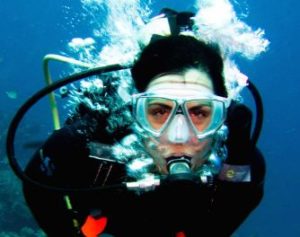Those who practice scuba diving can experience an annoying toothache during this type of sport. A problem that takes the clinical name of barodontalgia, that is a toothache due to pressure changes. The diver who dives equipped with a 15 liter cylinder containing compressed air at 200 atmospheres draws from the regulator air it needs to breathe properly underwater. As a result of the external pressure, the air breathed with the help of the cylinder reaches in addition to the lungs all the other cavities of our body, generating a spontaneous compensation.
The compression or expansion of the gas during the immersion phase could give rise to annoying pain in the teeth as well as in the nose or ears.
The correlation between toothache and scuba diving
 It was precisely a pain in the teeth felt during a diving that led Vinisha Ranna, a university student at the Buffalo school of dental medicine in New York, to investigate the link between underwater activity and dental health.
It was precisely a pain in the teeth felt during a diving that led Vinisha Ranna, a university student at the Buffalo school of dental medicine in New York, to investigate the link between underwater activity and dental health.
“Anyone who wants to dive has to undergo a screening to check their general health, but no dental check-up is included in the check-up,” says the researcher who published the results of the analysis in the British Dental Journal.
The research involved hundreds of amateur divers who were asked if they had ever experienced pain or dental problems during or after the dive. 42% of the participants said they had suffered from barodontalgia, i.e. tooth pain related to pressure changes.
“About a quarter of the divers involved in the research had tooth pain related to the air regulator that must be kept in the mouth during the dives, 22 percent had jaw pain, instead in 5 percent of the participants had checked for problems with the crowns present and, in one case, with a filling ».
The causes of tooth pain during scuba diving
Tooth pain is also often caused by the impact of pressure on the air cavities in the mouth. Empty spaces that are created as a consequence of: caries, bad interventions, incorrectly performed root canal therapies. In some cases, the pressure difference is such as to “blow up” a filling or cause the breakage of a mobile prosthesis.
The pressure exerted on the front teeth to hold the mouthpiece can leverage the rear teeth, causing slipping, irritation and pain. Particularly painful can be the experience of a diver who has mobile prostheses. In fact, the prostheses, precisely because of the difference in pressure, can be easily moved. For this reason, for those who practice scuba diving, implantology rather than the insertion of mobile prostheses would be advisable.
General recommendations for the oral health of divers
In general, for those who practice this type of sport activity it would be advisable to constantly monitor the health of their teeth through these useful recommendations:
- At least one annual check accompanied by appropriate diagnostic tests performed in specialized centers
- Do not dive for at least 24 hours after a dental treatment performed with sedation
- Do not dive for at least a week after a dental surgery
















